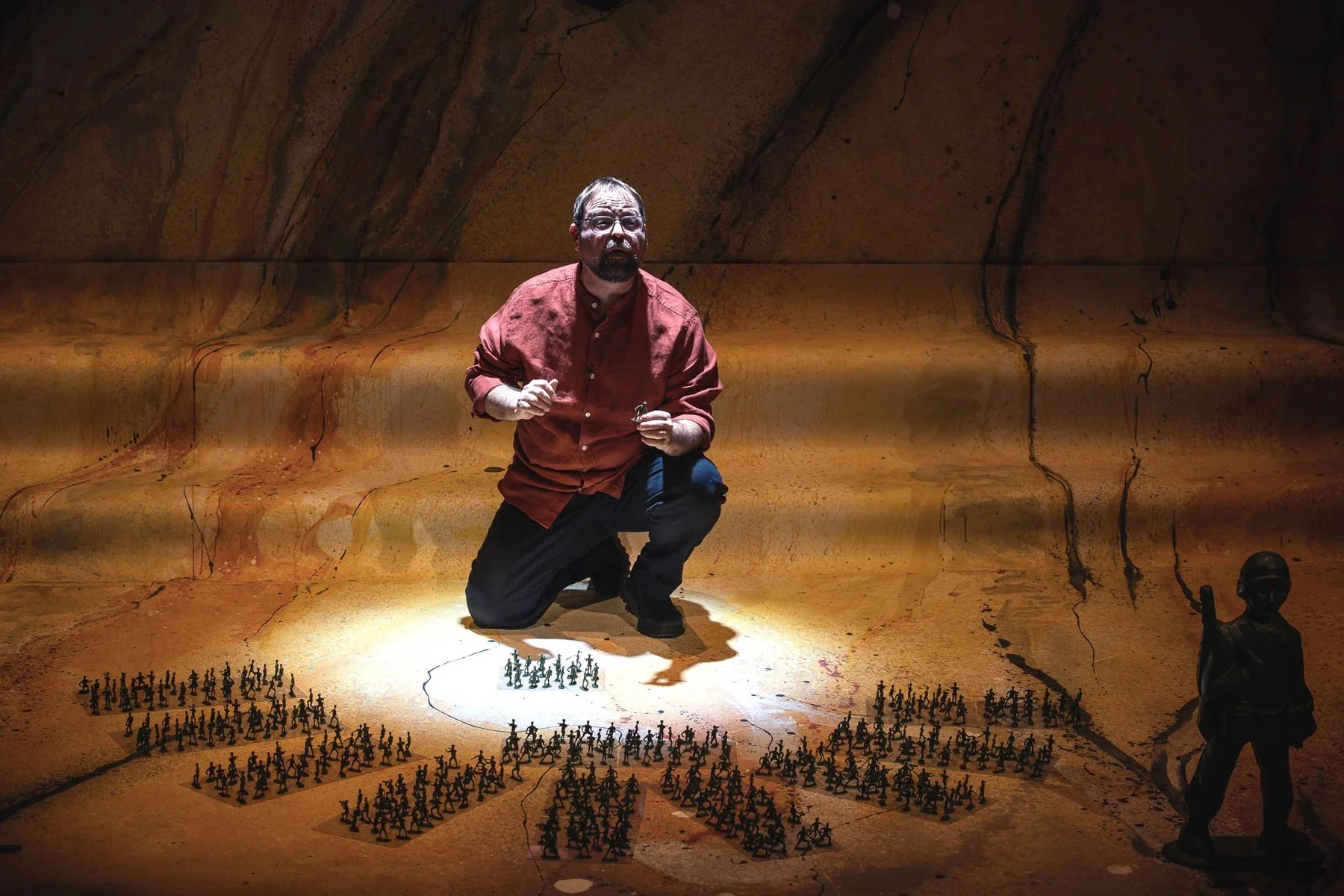Theatre review: Soldiers of Tomorrow's artful simplicity makes for strong storytelling
With mesmerizing live music by Emad Armoush and a small army of toy soldiers, Itai Erdal confronts his past in Israel’s military
Photo by Matt Reznek
The Elbow Theatre’s Soldiers of Tomorrow was at the Roundhouse Community Arts and Recreation Centre until February 5, as part of the PuSh International Performing Arts Festival
IN SOLDIERS OF TOMORROW, theatre artist Itai Erdal uses a box of little flags to skilfully encapsulate one of the most complex histories in the world. In an attempt to illuminate the tensions that rage on in Israel, he goes backward through the millennia, past the Ottomans, the Crusaders, the Romans, and into nomadic times, when no one considered themself a Jew or Christian or Muslim. Back then, people were just Middle Easterners, as the dryly witty storyteller puts it.
The brief flag scene is an illustration of Erdal’s unique talent for clear explanation, with simple yet artful props. In fact, for this viewer at least, it marked an immediate grasping the full picture of not just what is happening in Israel today, but why.
In fact, that applies to the whole, engrossing show, not just because of Erdal’s acerbic little history lessons scattered throughout, but searing anecdotes from the three years he spent serving out his mandatory military service in places like Lebanon and Gaza.
The now-Vancouver-based performer, who wrote the piece with Colleen Murphy, admits this is a difficult subject polite Canadians would prefer to avoid: “I have seen the glazed look in their eyes. I’ve had many people ask me about the conflict and within a minute they’re searching for the exits,” he says, and then hilariously points the way to the door. For those who stuck around—that would be the entire soldout weekend crowd—what was made absolutely clear was the urgency of not turning away from the topic.
In a brilliant bookend that brings the subject home, Erdal begins and ends the piece in the chair of his East Van Iraqi-born barber—musing on all the feelings he has of the man he considers a friend holding a straight razor to his throat. From there, he tells us about a beloved nephew who faces conscription back in Israel—a snapshot of the two together hangs symbolically for most of the show—and then delves back into the mess of guilt, anger, shame, and trauma that he still carries with him from his time as a soldier in the Israel Defence Forces. That’s despite the fact his mother has encouraged him to serve as one of the “good” ones, who wants peace.
Under the assured direction of Anita Rochon, Erdal makes the tough journey to seeing the lies he was telling himself—and the brutal truth that he was part of a group that not only oppressed others, but did not treat all humans equally. That idea comes to a climax in a riveting account of one traumatic checkpoint stop of a woman with an urgently sick baby.
What really makes Erdal’s stories hit hard is the world that the respected lighting designer turned playwright surrounds himself with in this show.
In a choice that enriches the messages and themes in Erdal’s piece, celebrated Vancouver-based Syrian musician Emad Armoush provides live accompaniment for the production. (As they both point out, they each left their home countries for the same reasons.) Armoush adds everything from heady Middle Eastern oud to the strains of Nirvana during Erdal’s adrenalized recounting of a full, IDF-army exercise.
Set designer Brian Ball has created a fascinating, desert-gold-hued abstract-painting rendition of the contested Middle East zone where Israel sits, stretched across the back of the stage to skew perspective. It covers part of the floor, where Erdal manoeuvres hundreds of tiny toy soldiers, which can represent everything from the collected masses of the IDF to the victims of the Holocaust. Effectively, three larger versions of those khaki-green toy soldiers stand in for three clearly delineated characters who capture the different points of view of Israelis forced to serve on the frontlines. Veteran lighting designer Alan Brodie brings still more dimensions to Erdal’s storytelling.
Soldiers of Tomorrow is a reminder of how powerful first-person stories can be onstage, and how rich they can become with creative stylistic choices. Adding to the experience here, of course, is his blunt honesty and openness. Erdal also has a sensitivity to detail—and basic human suffering—that brought many audience members to tears. You may not walk out with clear answers to one of the world's most challenging conflict zones, and it's a given that some may not even agree with Erdal's take. But at least you'll have a deeper understanding and a desire to hear more—without searching for the exits the next time it comes up.














